Международный опыт интеграции образования. Рубрика в журнале - Интеграция образования
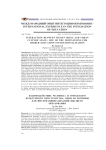
Статья научная
Introduction: the objective of this paper is to deeply and clearly explain the internationalisation of higher education from the aspect of the integration of human being with urban cultural space. Materials and Methods: the methods used in the research are mainly analytical and descriptive ones enabling to show how the integration of human being and urban cultural space promote and influence the internationalisation of higher education. Results: the motivation for the internationalisation of higher education is closely interrelated with that of urbanisation. Besides the economic and political incentives, modern urban culture, caused by globalisation, also plays a very important role in encouraging higher education internationalisation. Discussion and Conclusions: the appearance of higher education internationalisation is mediated by the alteration of the existing environment of urban culture space against the background of city internationalisa-tion. Human beings' need for self-assurance in urban culture space helps to stimulate the internationalisa-tion of higher education, and human beings promote the development of modern culture space and their separation in urban culture space accelerates the development of higher education. From the perspective of higher education internationalisation, to sort out the cultural motivation for higher education and find its suitable form for the city's internationalisation is crucial for adjusting the orientation and guaranteeing the efficacy of higher education internationalisation. From the aspect of human beings' development, the separation between urban space and human beings caused by the city's ongoing internationalisation is a pressing problem to be solved. From the aspect of the construction of urban culture space, as an important means of retaining human beings' equilibrium, urban culture promotes the internationalisation of higher education.
Бесплатно
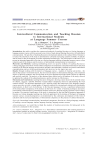
Статья научная
Introduction: the article considers the content and methods of teaching Russian as a foreign language at language summer courses with due account to (as a form of study-abroad training) the motives of intercultural communication. The specifics of teaching Russian to international students in the cultural field of Ukraine is revealed. The timeliness of the study is determined by constantly increasing academic mobility of students and the need for the development of modern educational technologies. The main purpose of the article is to present an integrated approach to Russian as a foreign language teaching at language summer courses, when cultural needs of the trainees and the motives of intercultural communication are considered. Materials and Methods: teaching methodology draws on specific methods of teaching Russian as a foreign language and models of intercultural competence development. Educational materials for practical teaching of the Russian language are presented; qualitative and quantitative methods to research intercultural communication motives (written questionnaires and interviews on key topics) are used. Results: through working with the learners of language courses - students of Austrian universities - the data on the learners' motivation factors, the most relevant topics for intercultural dialogue, some important aspects of Russian grammar, and also the data on the most popular knowledge about Ukraine are obtained and carefully analysed. The analysis of the obtained data, carried out by the authors of the study, allowed to optimise the content of the educational process and to increase its effectiveness. Discussion and Conclusions: teaching Russian to foreigners, showing a keen interest in the cultural values of Ukraine, suggests a parallel formation of intercultural competence based on understanding the local cultural realities. The presented approach to RFL teaching within the framework of the language summer courses provides not only a strong uptake of linguistic material by international students and considerable improvements in their level of proficiency in the Russian language, but also a significant enhancement of the intercultural competence of the trainees on the basis of a variety of teaching techniques and active intercultural communication of international students with native Russian language speakers when working in tandem. The practical significance of the study is determined by the fact that the proposed approach to Russian as a foreign language teaching may find wide application in the training of foreigners at language summer courses; research perspectives are determined by the continuous development of this form of education and the increased importance of intercultural competence in the practice of cultural interaction.
Бесплатно
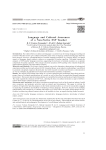
Language and cultural awareness of a non-native ESP teacher
Статья научная
Introduction. The relation between culture and language is a central issue in foreign language teaching and research where the need to give cultural content the same value as language content and language skills has been stressed. However, conceptualization of teacher language awareness, by focusing largely on formal aspects of language, largely neglects culture as a component of teacher cognition. This paper expands the category of ESP-teacher language awareness suggesting the inclusion of cultural awareness as a separate component of teacher cognition. This concept extension actualizes ESP teaching in the situation shaped by unprecedented mobility and intercultural contacts. Materials and Methods. The historic-logical method was used to determine shortcomings of pedagogical experience and the need to teach culture in ESP. Grounded theory, as an inductive methodology, was utilized to generate conceptual expansion theoretically tied with research in medical and business communication as well as with data on population movement and international scientific cooperation. Results. We defined ESP-cultural knowledge as a system comprising the permanent (know-that) and temporary (know-of) cultural manifestations in a society as well as how they are manifested through language (know-how). That system practical representation is exemplified in medicine and business English discourse. The study expands the structure of ESP-TLA, claiming the focus on cultural awareness as part of ESP discourse which fosters cultural-response education. Discussion and Conclusion. Such claim is pertinent to practitioners involved in the tourism industry, health care, economics, and academic activities such as research and development. This paper is relevant for teachers of English for Specific purposes in the fields mentioned above as well as for researchers engaged in analyzing the problems and methods of teaching a foreign language. However, because of the multiple manifestations and complexity of student motivation to get ESP course, the paper acknowledges the difficulties in addressing cultural content salient to all students in class, an aspect meriting further research.
Бесплатно
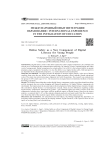
Online safety as a new component of digital literacy for young people
Статья научная
Introduction. Digital literacy refers to the skills required to achieve digital competence, the confident and critical use of information and communication technology for learning, leisure, communication and future work of young people. Digital competence has a dual nature. First of all, it is the technical ability to operate programs, pages, equipment. Secondly, it is also the ability to use digital media safely. Both perspectives are important in the educational perspective, i.e. media education and socialisation. Materials and Methods. The paper presents the attempts to measure digital literacy in the area of threats resutling from using the new media in the group of upper-secondary school students (fourth educational cycle). The study was carried out using a diagnostic test with 18 questions. The research was conducted in the group of 1693 youths aged 15-21. The research was designed based on traditional methods of testing knowledge and skills. Results. The findings showed that the weakest digital literacy component was the copyright-related knowledge and the strongest area was online shopping and financial operations. All digital literacy components are interrelated. The improvement in one area leads to the development of other digital literacy elements. Despite this correlation, digital literacy is a heterogeneous concept. There are also differences regarding certain digital literacy components, determined by gender - girls obtained higher test results in terms of the soft competencies whereas boys were better with the technical aspects of digital literacy. Based on the cluster analysis, we noticed that 41.41% of the students obtained good and very good results from the competence test. More than half of the students require further education in most of the analysed areas. Discussion and Conclusion. For educational decision-makers, the findings highlight the importance of designing training programs aimed at developing students' digital literacies, with a special focus on new topics as sexting, piracy and cyberbullying.
Бесплатно
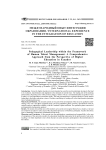
Статья научная
Introduction. University higher education in recent decades has seen the need to participate in projects that lead to its evolution, transformation and adaptation to the demands of current times. The leading role of the teaching professional is becoming more visible in these changes, which is why it is considered that the recognition of it as a leader is of vital importance to transform reality. The study presented has as a general objective to study teacher leadership in the higher education system of Ecuador considering its leading role in the transformative participation of educational processes. Materials and Methods. The research carried out was part of the development of the mixed or qualitative methodology. This was a two-phase sequential study. The first quantitative phase involved a questionnaire with descriptive analysis, applied the reliability with the Cronbach’s alpha coefficient. The qualitative phase consisted of an interpretative documentary analysis. Results. The results showed that most of the teachers surveyed do not recognize themselves as leaders, or at least are not known as leaders in some areas of the educational processes in which they participate. Teachers have three types of leadership: instructional, distributed and university. Discussion and Conclusion. At the present time the participation, commitment and responsibility in the area of competence of the university teacher, the educational leadership represented in the professional of university teaching, it is vitally important to move from discourse to action and active participation in the transformation of the realities.
Бесплатно
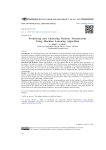
Predicting and analyzing student absenteeism using machine learning algorithm
Статья научная
Introduction. In a developed society, the state should invest in the education of the younger generation. In less developed countries, Albania included, there are no nation-wide studies to show the factors that affect the lack of students in classrooms. The purpose of this study is to predict, analyze, and evaluate the possible causes of student absenteeism using machine learning algorithms. The attributes taken into account in this study are related to the family, demographic, social, university, and personal aspects according to academic criteria. Materials and Methods. Student absenteeism covers any student that has not attended class, irrespective of the reason. The data set consists of 26 attributes and 210,000 records corresponding to the teaching hours of 500 students during an academic year at Faculty of Information Technology. The students participating in the survey range from 18 to 25 years of age of both genders. The compilation of the student questionnaire was based on reviewing the literature and analyzing 26 attributes that we categorized into 5 groups included in the questionnaire. Results. This paper provides knowledge in the analysis and evaluation of factors that lead students to miss lectures using machine learning. It is important to note that this study was conducted on students of this faculty, and as such, the results may not be generalized to all universities. That’s why, researchers are encouraged to test the results achieved in this paper on other clusters. Discussion and Conclusion. The paper provides recommendations based on the findings by offering different problem-solving strategies. The questionnaire used only for 500 Faculty of Information Technology students can be widely applied in any educational institution in the region. However, the results of this study cannot be generalized for the student and youth population of other regions or other countries. This paper provides an original and easily usable questionnaire suitable to various study programs and universities.
Бесплатно
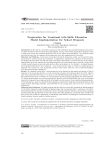
Preparation for vocational life-skills education model implementation for school dropouts
Статья научная
Introduction. In this article, social data on adolescent school dropouts are presented alongside a discussion of efforts to improve their life skills and employability. A focus on life-skills education for dropouts living in rural areas reveals how important business skills are for improving employability. The research context and efficient activities for coping with the addressed issues are comprehensively described. Materials and Methods. A previously developed Life-Skills Education model, involving field study, needs analysis, action research and evaluation, is elaborated to facilitate the collection of data related to the dropout rate and efforts to build soft skills to facilitate employability. Grounded theories on developing employability skills for dropouts are elucidated alongside real-world endeavours to provide a clear picture of what research objectives are achievable and how they can be achieved. Two districts - in Bantul Regency and Yogyakarta Special Province, Indonesia - were selected for the study, in which two sample groups of dropouts were involved in a set of planned activities. Observation, interview, survey and documentation were the main techniques employed. Results. The obtained results allow a fresh perspective to be obtained on the number and quality of school dropouts in the researched districts, as well as potential solutions for improving their life skills. Specifically, they include the following: (1) As many as 164 identified adolescent dropouts were found to live in the researched rural areas, of which 75% were unemployed, thus requiring appropriate life-skills education. (2) Twenty trainer-tutors were selected according to specific criteria and provided with a set of developed materials of respective knowledge and skills to be taught over the course of a one-month training programme. (3) In both districts, tutors accomplished the pedagogical content knowledge based training programme had improved their knowledge, attitudes, and motivation by the average gain score of 32.30, 3.15, and 5.55 respectively. Discussion and Conclusion. This paper suggests that the study has successfully prepared the implementation of Life-Skills Education model through its applied stages and recommends that (1) continuous Life-Skills Education programmes to improve the business skills of teenage dropouts should be carried out by managing and developing the qualifications of the tutors and by providing appropriate vocational skills suitable with their needs, and (2) that the contribution of educational interventions on pedagogical content knowledge in interdisciplinary domains might be further analysed.
Бесплатно
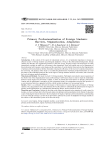
Primary professionalization of foreign students: barriers, stigmatization, adaptation
Статья научная
Introduction. In the context of the export of educational services, it is of particular importance to design an efficient system of foreign students’ psychological adaptation. Owing to the ethnocultural background, foreign students feel that they are stigmatized minorities in the host society. Negative images and stereotypes are often internalized, resulting in stable low self-esteem in the stigmatized. Since self-esteem acts as a key parameter of the professional self-concept, social stigma and the experience of social identity threat activate the stigmatization of primary professionalization, thereby drastically reducing the efficiency of the received vocational education at the university. The purpose of the study is: to outline the phenomenon of primary professionalization, to reveal the nature of the relationship between the social stigma of foreign students and their self-esteem, and to describe the levels of primary professionalization. Materials and Methods. The study involved 124 foreign students. Participants were asked to answer questions of the Short Form of the Stigmatization Scale and Rosenbergʼs Self-Esteem Scale in order to track the relationship between social stigma and self-esteem. Further, in order to identify the basic barriers to primary professionalization and the participants’ perception of their stigmatized status, the respondents answered the questions of a semi-structured interview supported with the critical incident technique in a focus group format. Results. There is a correlation between the degree of obviousness of social stigma and self-esteem of foreign students. The categorization of the data obtained allowed the authors to substantiate the phenomenon of stigma of primary professionalization, to systematize the determining factors, and to describe its levels. Discussion and Conclusion. Despite the fact that social stigma has attracted active attention of world science for decades, we have not been able to find focused studies into primary professionalization in the format of education export. Studying the factors that lead to the development of stigma of primary professionalization, understanding its levels will help to design a system for its prevention, optimize the system of adaptation of foreign students to the realities of the educational system of the host university.
Бесплатно
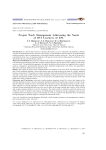
Project work management addressing the needs of BVI learners of EFL
Статья научная
Introduction: it is known that inclusive education that opens access to education and facilitates students with special educational needs to socialize successfully is concentrated in special schools whilst mainstream teachers generally lack the methodology of teaching disabled students inclusively. The aim of the article is searching the best ways of educating students with special needs and providing specific conditions of the educational process in mainstream schools. Materials and Methods: the research is based on the results of fulfillment of a number of projects that deal with teaching and educating blind and visually impaired learners and in which all the authors of the article were involved. The problematic approach, the logical method and observation were applied to the research; analysis, comparison, generalization being the most important components of the study. The quantitative data were collected, analyzed and resumed as well. Results: the impact of project work implementation on academic and social skills development of blind and visually impaired students is shown and various types of projects that can be made by visually impaired learners are presented. The authors give their comments when analyzing different ways of adapting research activities to the needs of BVI learners. When speaking in detail on the role of web tools as maximizers of students' potential the authors refer to their own experience in implementing web tools in project work with blind and visually impaired learners. Discussion and Conclusions: university teacher-training programs should be revised and improved by offering additional courses aimed at educating impaired students through doing research or project work. Special attention should be paid to developing the instructors' project management skills in terms of teaching English as a foreign language to learners with special needs. It should be noted that different methods and various technological tools are to be used in order to develop research and creative skills of blind and visually impaired learners in an EFL classroom. The article itself, its references and links can be used within the course of lectures and seminars on Methodology of Teaching Foreign Languages, and can also be applied when developing a course of re-training of in-service teachers with particular focus on teaching foreign languages to students (pupils) with special educational needs.
Бесплатно
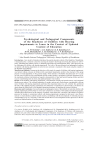
Статья научная
Introduction. А new model of education introduced in general education schools of the Republic of Kazakhstan, is characterized by a criterion system for assessing the student’s knowledge (involving the student, his self-esteem), stimulating the student’s activity in obtaining knowledge and communication skills. These processes can be challenging for children with hearing impairment. The issue of the psychological and pedagogical readiness of students with hearing impairments to switch to new curricula is examined in this study using the example of the Republic of Kazakhstan. Materials and Methods. Pursuant to the objectives of the study, the sample of children with hearing impairments, was formed without exclusion of children with concomitant impairments similar to the structure of this group present in overall population. In the general sample, which includes 138 children and adolescents 10-15 years old who were divided into four experimental and four control groups in accordance with their educational level, the emotional-volitional, intellectual and cognitive characteristics of deaf and hard-of-hearing children and their success in performing tasks in classic and updated programs were studied. Results. In the children with hearing impairments, visual attention, hearing and speech memory, and conceptual thinking were reduced. The volitional regulation of complex actions and visual memory corresponded to the age norm. Children with hearing impairments performed the educational tasks less well, whereby they performed the tasks of the updated programs significantly more efficiently in comparison to classical tasks. Conclusions are drawn about the effectiveness of the updated educational programs for teaching this group of children. Discussion and Conclusion. Our psychological and pedagogical study of this problem reveals that children with hearing impairments perform better at some tasks compiled in accordance with updated educational programs, indicating their effectiveness for this category of students. At the same time, a decrease in the number of cognitive processes of students in correctional schools with hearing impairments compared to their peers is also shown, namely in visual attention, auditory-speech memory, and thinking with the development of volitional processes corresponding to age. It is necessary to take into account the level of development of these processes in the formation and implementation of training programs.
Бесплатно
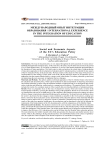
Social and economic aspects of the EU's education policy
Статья научная
Introduction. The issue of education policy is very topical throughout the entire spectrum of society and undoubtedly throughout the European space. At the same time, this policy must be taken into account in any period of a civilized human history. By investing in education, we invest in the human population and participate in the formation of future generations. This article aims to study and analyse the current state of implementation of innovative approaches to the development of education and EU education policy, to identify the key aspects of the EU Education Policy at the present time. We focus mainly on the analysis of the range of the process of implementation of the Strategy Europe 2020 in this field with the particular impact on incorporation of new approaches into the current education policy system as such in the modern 21st century education system based on determining the tools necessary to implement the key strategies. Materials and Methods. The authors address individual approaches of the EU Member States in the field of the education and education policy, which can be beneficial for later incorporation of improving innovations into national education systems using the traditional methods of empirical analysis as description and classification, induction and deduction, content analysis, comparison and syntheses. The empirical basis of this study includes the results of a secondary analysis of the research data covering the problems of education policies. Results. There is a pragmatic focus on the issue of education in society, which also results, in terms of the macroeconomic indicators, in raising the standard of living of the population. Based on our conclusions, where we identified the real need of in-depth analysis of the situation in the education sector and a strategy to achieve effective change in mainstream educational thinking, policy and practice. We should not only determine where the sector is at present, but also engage as many institutions as possible in the review process, making sure that it is driven by their needs and to set key determinants of the education policies of the individual Member States in order to achieve the EU's objectives in terms of education, competitiveness and social cohesion. The results of the study have practical significance: the mechanisms can be reproduced in the field of defining the instruments of the harmonization in the EU education policy with the competences of the Member States Discussion and Conclusions. The attention is drawn to the socio-economic context that affects the education policy, and despite the pursuit for a kind of harmonization in the EU, the education policy remains substantially within the competence of the Member States. Our results suggest that the use of integrative mechanisms allows to improve the efficiency of EU education policy and at the same time the Member States education policies. The main directions for further research in this field and questions for discussion and another positive move remain: what are the challenges facing education policies EU and Member States in the context of globalisation, the expansion of the European Union and the imperative of sustainable development.
Бесплатно
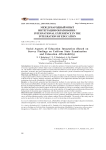
Статья научная
Introduction: the purpose of this article is to study the opinion of interested and non-professional segment of society regarding the Uniform State Exam on mathematics and affordability of higher education in Russia. The authors checked the hypothesis of interconnection between social opinion and changes in the exam procedure, economic and socio-demographic situation, educational system reformation and integration of educational space in the RF and other countries. Materials and Methods: we studied the survey data of students in Togliatti State University, their parents or legal representatives between 2009-2016. We processed the results by methods of probability assessment with the help of complex features reflecting possibilities of the applicants admitted to higher educational institutions and social affordability of higher education. Results: we theoretically grounded and developed the method of social opinion study about the Uniform State Exam and affordability of higher education in the region. Dynamics of social opinion was studied with the help of adapted probability rates describing either quantitative or qualitative features of social processes. We studied and analyzed scientific papers devoted to the attitude of society to secondary school final exams, admission to higher education institutions, and social mobility of the applicants and determined theoretical background of education space integration with the education systems of other countries. Discussion and Conclusions: the research showed that even in the region with visible economic and so-cio-demographic problems the concerned part of society gradually understands that the Uniform State Exam serves to keep education quality in the country making it more affordable. The results of the study may be useful to specialists in the field of education, as well as interesting to the general public.
Бесплатно
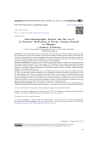
Статья научная
Introduction. The research paper seeks to identify the level of motivation of Slovak educators teaching in Hungary in the context of a low level of teachers’ motivation in Central and Eastern Europe. The aim of the paper is to show the relationship between socio-demographic factors (age, gender, type of school) and the degree of teachers’ motivation at Slovak national schools in Hungary. The results of research on motivation in relation to gender, age and type of school are shown to be inconsistent and yield varying findings. Materials and Methods. This paper is based on the data collected in the survey conducted in 10 Hungarian counties between January and April 2019, using a sample of 139 teachers of ethnic schools (monolingual, bilingual and schools teaching the ethnic language as a separate subject). We processed the obtained research results using methods of descriptive statistics and methods of inferential statistics (Pearson correlation coefficient; Mann-Whitney U test; Kruskal-Wallis H test). Results. The results showed that there was no correlation between the teacher’s age and teaching motivation (p > 0.05). No statistically significant differences were found between gender and teaching motivation when using the Mann-Whitney test. Using a non-parametric Kruskal-Wallis test, the existence of significant differences in the level of motivation of teachers working at various types of schools was confirmed. The research showed that teachers of bilingual schools were the most positive in relation to motivation, and the lowest average scores were achieved by teachers in schools where Slovak is taught as a subject. The age and gender of teachers were not significant in relation to the evaluation of the degree of motivation for teaching Slovak. Discussion and Conclusion. The results presented in the article will be beneficial not only for pedagogical researchers, but especially for Slovak teachers in Hungary, as research of this kind was conducted for the first time.
Бесплатно
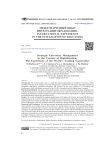
Статья научная
Introduction. The research paper's aim is to study the ongoing digitalization in all spheres of economy, which inevitably impacted on the strategic university management. It explains how universities and higher educational institutions strategically positioned themselves and searched for the novel pathways for innovation and development, which was further reinforced by the COVID-19 pandemic and the digital surge it brought. Materials and Methods. The authors analyzed the strategic university management in the context of digitalization using the literature review and their own analysis. They focus on the experience of the world's best universities for inspiring the institutions of higher education in other countries and regions, helping them to improve information and communication technologies and digital skills. Results. Our results corroborate the ongoing digitalization in all spheres of economy and social life which was pushed further by the COVID-19 pandemic contributed to the transformation of the higher educational institutions challenging them to embark upon the path of in-depth transition, restructuring, and re-thinking their role and their mission with regard to the new challenges and novel technologies that are available on the market. Discussion and Conclusion. The outcomes present interesting possibilities for their application in practice for some countries, most notably Russia. They can be of a special interest not only for the government officials responsible for fostering higher education and devising guidelines for the strategic management of universities and higher educational institutions, but also for the academic environment with its researchers and lecturers who seek to innovate based on the most recent and advanced trends in higher education (e.g. ministries and national authorities responsible for science, research, and education in different countries, such as the Ministry of Science and Higher Education, Ministry of National Education, Ministry for Research, as well as National Educational Authority or the World Bank, just to name a few).
Бесплатно
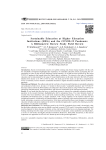
Статья научная
Introduction. Recent environmental concerns over global warming and climate change together with the calls for sustainable development highlighted the importance of sustainable education aimed at preparing the new generations to come for the universal challenges facing humanity. All of that has been reinforced by the recent COVID-19 pandemic that brought about the digital surge in education. The interest in the topic of sustainable education can be demonstrated by the surge of research publications on this topic indexed in the Web of Science database from merely 22 in 1991 to 4055 in 2022. The main goal of this study is to provide a comprehensive review of scholarly sources related to sustainable education in higher education institutions and the COVID-19 pandemic.
Бесплатно
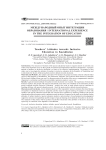
Teachers' Attitudes towards inclusive education in Kazakhstan
Статья научная
Introduction. The inclusion of students with special educational needs in regular schools is currently one of the most important issues on the agenda of national and international education communities. A positive attitude of teachers to inclusive education is a factor of its effective implementation. The purpose of this study was to investigate the attitude of teachers to inclusive education in the Republic of Kazakhstan and to determine the factors influencing their positive attitude towards inclusion. Materials and Methods. The sample consisted of 416 teachers of general secondary schools in the Pavlodar region of the Republic of Kazakhstan. The Sentiments, Attitudes, and Concerns about Inclusive Education Revised scale feedback form was used. For the processing of the results of the survey, nonparametric statistics (Spearman's correlation coefficient) and multiple regression analysis were used. Results. A general neutral attitude of teachers towards inclusion was revealed. The experience of interaction between teachers and people with special educational needs does not contribute to the formation of their positive attitude towards inclusion. Educators - people who work in rural schools and are confident in teaching children with special education needs - have the most positive attitude toward inclusion. Discussion and Conclusion. A more detailed analysis of the respondents' answers indicates the disinclination of teachers to implement inclusive education and the need for special training of teachers to work with children with special education needs that will increase their confidence in teaching children with special educational needs and create a positive attitude towards inclusion. Prospects for the study are to further explore attitudes of subject teachers, special education teachers, and providers of psychological and pedagogical support to inclusion in Kazakhstan and the impact of special training on the attitude of teachers to inclusion. The materials of the article will be useful to researchers interested in the problem of inclusive education, especially its condition in the Republic of Kazakhstan.
Бесплатно
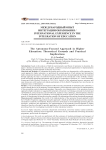
The autonomy-focused approach in higher education: theoretical grounds and practical implications
Статья научная
Introduction: based on the analysis of both the current practice and theory of autonomy in education, this paper is intended to determine the core principles, conditions and practical opportunities for implementation of the autonomy-focused approach in Russian universities. Materials and Methods: to substantiate the benefits and reveal the core characteristics of the autonomy-focused approach in higher education, we performed the content-analysis of both national and international higher educational documents. The practical aspects of the autonomy-focused approach have been examined through applying the ideas of autonomy-focused education to the introduction of the G-MedEx international networking educational programme (the G-Med Ex Programme) at Professor V. F. Voino-Yasenetsky Krasnoyarsk State Medical University in 2015-2016. Analysis of the educational process outcomes and open discussions with teachers and students-participants of the G-MedEx Programme have also become an important source of information. Results: it was revealed that the development of the university educational environment actors' autonomy is possible though the use of the autonomy-focused approach, which represents a critical tool for implementation of the personality-centred educational paradigm. Among the core characteristics of the autonomy-focused approach in higher education we suggested the principles of innovative self-change, personal involvement and self-fulfillment, critical awareness and self-reflection, readiness to face challenges, interdisciplinary character of training, and practical focus of education. Investigating the practical aspects of the autonomy-focused approach, we demonstrated its benefits using the example of an international networking educational programme. Discussion and Conclusions: the results of the implementation of the autonomy-focused approach within the G-MedEx Programme suggest that using this approach is beneficial for both medical university students' and teachers' autonomy development. Practical relevance of the study is ensured through specifying the core principles, conditions and opportunities for implementation of the autonomy-focused approach in higher education, therefore allowing for possible application of the described approach in various universities and providing a basis for investigating its potential in other educational contexts.
Бесплатно
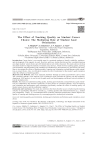
Статья научная
Introduction. Career choice is an essential stage for vocational students to identify suitability, readiness, and development of the capacity to work. However, until now, studies that discuss how vocational learning can shape students' career choices are still limited and not yet widely discussed. This study aims to develop structural models to shape the maturity of student career choices, which involves teaching quality, learning goal orientation, and performance goal orientation in collaboratively and interactively. Specifically, this study aims to investigate the effects of teaching quality, learning goal orientation, and performance goal orientation on career choice. Also, it will help to examine the role of mediation for the student's goal orientation under the influence of teaching quality. Materials and Methods. Data were collected randomly through an online questionnaire survey from 289 vocational students in the tourism field in Indonesia which included the culinary art and hospitality department. SEM analysis is used to test the path model and bootstrapping confidence interval estimate to test the mediation role. Results. This study revealed that teaching quality, learning goal orientation, and performance goal orientation are collaborative and interactive predictors of career choice of vocational students. Also, the learning goal orientation and performance goal orientation significantly mediate the effect of teaching quality on student career choices, and this mediation is partial. Discussion and Conclusion. This study also reinforces the theory that the success of achieving the learning outcome is significantly affected by external (e.g., teaching quality) and internal dimension (e.g., student goal orientation). Finally, it is recommended that vocational education practitioners should improve the quality of learning and teaching process by encouraging positive student goal orientation.
Бесплатно
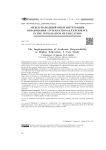
The implementation of academic responsibility in higher education: a case study
Статья научная
Introduction. Academic responsibility consists in the duty of higher education providers to their students. By implementing academic responsibility, these providers respond to the demands of their society. The purpose of this article is to explore and analyse: implementation of education and teaching; mentoring; service to the university; research, publication; community service and changes. Materials and Methods. A qualitative research approach, employing the case study method, was used. Data were obtained from in-depth interviews from lecturers and students, field observations, as well as collating and reviewing documents. Results. The results of the study show that, in the implementation of education and teaching, the planning stage refers to the process of drafting the semester lesson plan. Student-centred active and participatory learning models are maintained; in mentoring, the guiding process simultaneously combines academic guidance, career guidance and personal-social guidance. While service provision is prioritised as one of the important educational aspects, in the implementation of research, it improves the ability of lecturers to research; in publications, to meet writing standards, peer assessment standards and documentation standards; in community service, it consists at the level of how to devote the knowledge possessed by the academic community to the progress of society; in change leadership, it involves technology, structure and human resources. Discussion and Conclusion. There is a commitment to support the implementation of academic responsibility of higher education through engagement in teaching, mentoring, serving the university, discovering, publishing, truth-telling, serving the community and leading change. This academic process shows the value of commitment to a better quality of higher education.
Бесплатно
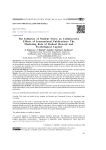
Статья научная
Introduction. The international publication is now a requirement for graduate students. It is part of the strategy of higher education institutions to improve their quality and compete at the global level. Hence, their intention to develop academic networks and their level of acceptance at the international level. Accordingly, this study seeks to investigate the mediation role of reward and psychological capital on stress relations and student effort for international joint publications. Materials and Methods. There are 421 master and doctoral students employed in this research. The data collected by questionnaire. The Structural Equation Modeling (SEM) is used to analyze the data. Results. The results show that the reward and psychological capital mediate the effect of stress on the student effort for international joint publication. The overall analysis shows that stress does not affect the student effort for international joint publication. Hence the mediation analysis is necessary for explaining the evidence of the stress-effort relationship. The reward is found significantly mediated by the stress-effort relationship and stresspsychological relationship, and the psychological shows a significant effect on the reward-effort relationship. The model of this study represents the joint mediation effect of rewards and psychological capital on the stress-effort relationship in the satisfactorily model of compliance. Discussion and Conclusion. This finding makes researchers develop the integrated behavioral model of stresseffort relationship by using various behavioral mechanisms in order to extend student achievement on international publication.
Бесплатно

